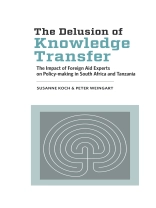With the rise of the ëknowledge for developmentí paradigm, expert advice has become a prime instrument of foreign aid. At the same time, it has been object of repeated criticism: the chronic failure of ëtechnical assistanceí ñ a notion under which advice is commonly subsumed ñ has been documented in a host of studies. Nonetheless, international organisations continue to send advisors, promising to increase the ëeffectivenessí of expert support if their technocratic recommendations are taken up. This book reveals fundamental problems of expert advice in the context of aid that concern issues of power and legitimacy rather than merely flaws of implementation. Based on empirical evidence from South Africa and Tanzania, the authors show that aid-related advisory processes are inevitably obstructed by colliding interests, political pressures and hierarchical relations that impede knowledge transfer and mutual learning. As a result, recipient governments find themselves caught in a perpetual cycle of dependency, continuously advised by experts who convey the shifting paradigms and agendas of their respective donor governments. For young democracies, the persistent presence of external actors is hazardous: ultimately, it poses a threat to the legitimacy of their governments if their policy-making becomes more responsive to foreign demands than to the preferences and needs of their citizens.
Koch: The Delusion of Knowledge Transfer [EPUB ebook]
The Impact of Foreign Aid Experts on Policy-making in South Africa and Tanzania
The Impact of Foreign Aid Experts on Policy-making in South Africa and Tanzania
购买此电子书可免费获赠一本!
语言 英语 ● 格式 EPUB ● 网页 396 ● ISBN 9781928331414 ● 文件大小 5.9 MB ● 出版者 African Minds ● 市 South Africa ● 国家 ZA ● 发布时间 2023 ● 版 1 ● 下载 24 个月 ● 货币 EUR ● ID 5221946 ● 复制保护 Adobe DRM
需要具备DRM功能的电子书阅读器












